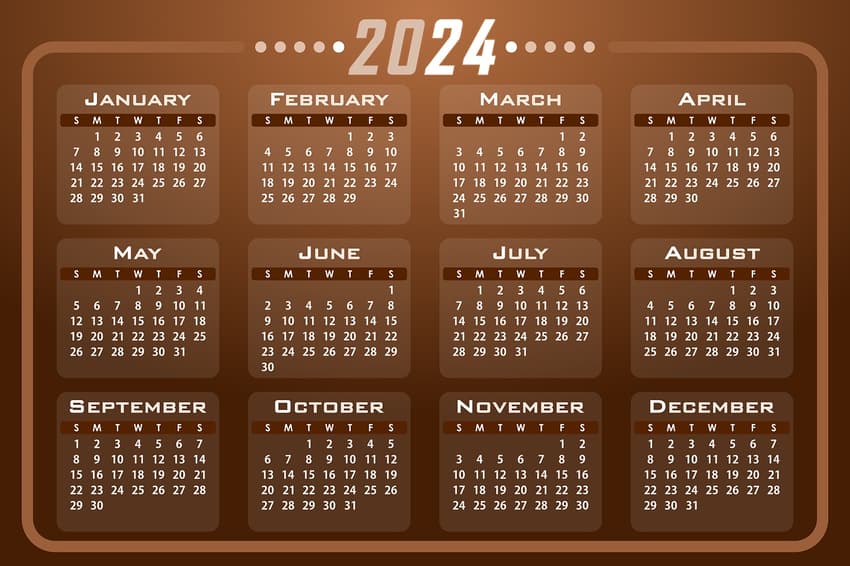Everything that changes in Switzerland in 2024

While it is too early to know everything that will happen in Switzerland throughout 2024, we have compiled the main changes and events that are set to happen in the next 12 months.
January
Lots of changes are happening in the first month of the year, which we will explain in more detail in a separate article.
Here is an overview of some of them:
Higher health insurance premiums will go into effect
Premium rates for the compulsory health insurance (KVG / LaMal) will increase by 8.7 percent on average.
However, hikes will be even more significant in some cantons, where premiums will exceed the national average— for instance, in Zug (10.2 percent), Nidwalden and Thurgau (9.5 percent), Vaud (9.9); Geneva (9.1); and Neuchâtel (9.1).
Electricity prices will rise as well
Another major expense for Swiss households starting in January will be electricity costs, which will increase by an average of around 18 percent.
Again, this is a national average; locally, tariffs will be higher in some cantons and communities.
Zurich residents, for instance, can expect a 24.5-percent increase, in Geneva rates will go by 28.6 percent, and in Vaud, which has many electricity suppliers, hikes will range from 32 to over 40 percent.
This government link shows by how much electricity prices will go up in your community.
End of tax breaks for electric vehicle owners
As an incentive for people to buy electric vehicles (EVs), which are more environmentally-friendly than conventional automobiles, the government had exempted these cars from the import tax since its introduction in 1997.
However, from January 1st, EVs will be subject to the same 4-percent import duty imposed on traditional fuel vehicles.
READ ALSO: Why electric car owners in Switzerland will have to pay tax in future
New motorway vignettes
You have the whole month of January to either affix the 2024 sticker to your car’s windshield or purchase an electronic version.
If you don’t, and are caught on one of the country’s motorways without one, you will be slapped (though not literally) with a 200-franc fine.
February
Like every year, February is a traditional “family ski” month, when children get a week off from school, so families can head to mountain resorts.
Dates of this winter holiday vary among cantons; you can see the ones for your region here.
Prices are expected to go up during the upcoming winter season.
Skiers face higher prices in some Swiss ski resorts.
However, about half of Switzerland’s main resorts — including Zermatt, Verbier, and Crans-Montana, among others — are banking on the so-called ‘dynamic’ price model, which will allow you to purchase cheaper tickets.
This means the price of the ski pass is not fixed, but depends on when you buy the ticket and when you plan to use it.
Ash Wednesday
February 14th will mark (aside from the Valentine’s Day) the beginning of Lent, which starts with Ash Wednesday and ends on Easter Sunday (see below).
 Swiss families take to the slopes in February. Photo: Pixabay
Swiss families take to the slopes in February. Photo: Pixabay
March
Five events will take place in March —with three on the same day, which is a rare occurrence.
Voting
The first round of the national 2024 referendums is scheduled for March 3rd.
Two pension and retirement issues will be voted on, including one on the 13th pension.
READ ALSO: What is Switzerland's 13th-month pension plan and why are they voting on it?
The second event will occur on March 20th at precisely 4:06 am: the beginning of spring, the so-called Vernal Equinox.
Then, on March 31st:
Daylight savings time will begin, when we will set our clocks forward one hour and lose an hour of sleep.
Easter will fall on Sunday March 31st
And, last but not least, March 31st is also the deadline for Swiss tax returns to be filed.
April
Usually, April is the traditional Easter month, but in 2024, its thunder is stolen by March.
However, spring school break will spill over into April, with dates varying from canton to canton.
June
Voting (again)
On June 9th, the second round of national referendums will be held, with issues to be put to vote yet to be determined.
Summer!
June 20th marks the first day of summer, when the sun will be at its highest point, with the most hours of daylight and least hours of darkness of any day in the year.

On June 20th, sun will be high in the sky. Photo: Pixabay
July
With schools on summer break, July is a traditional vacation month in Switzerland and much of the country comes to a standstill (the same way as Italy and France do in August).
The Federal Council and the parliament are also on a break, so political life slows down as well.
August
This month starts with Switzerland’s National Day on August 1st which, needless to say is a public holiday in all cantons.
READ MORE: Why Switzerland celebrates its national day on August 1st
August also marks the back-to-school month, with dates varying by cantons.
September
Thanksgiving
On September 16th, all Swiss cantons (except Geneva) celebrate the Federal Day of Thanksgiving, Repentance and Prayer, locally known as Eidgenössischer Dank-, Buss- und Bettag (German), Jeûne federal (French), Digiuno federale (Italian) and Rogaziun federala (Romansh).
It is a day of solidarity and fraternity, bringing people together and showing worshippers that they have a shared responsibility for each other and the world.
Adieu summer, hello fall
Autumn season will officially begin on September 22nd at 2:43 pm.
Swiss go to the polls
The third round of national referendums is scheduled for September 22nd.
October
Schools in Switzerland will be on a fall break for two weeks.
Turn the clocks
On October 29th, Daylight Savings Time will end, with clocks turned backward one hour, which means there will be more light in the morning.
New premiums
Swiss health insurance providers will also publish their official rates for 2025 which, hopefully, will be lower than current ones.
November
In what has by now become a familiar trek to the polls, the Swiss will vote in the fourth (and last) round of referendums on November 26th.
Cancelling insurance
This is also an important month for people who have a compulsory health insurance (which is practically everyone in Switzerland), as November 30th is the deadline to cancel your plan and switch to another one for the following year — if that’s what you would like to do.
December
New public transportation timetable
As each year on the second Sunday of December, Swiss Federal Railways (SBB) will publish their 2025 timetable on December 8th.
Trains, buses, and trams across Switzerland will adjust their schedules accordingly.
Winter is here
December 21st marks the beginning of winter season.
Christmas Day (December 25th) is a national holiday.
And (as though you needed to be reminded), 2024 will end, hopefully on a peaceful and happy note, on December 31st.

Each year end the same way...Photo: Image by Gerd Altmann from Pixabay
What else can you expect in 2024?
Some new measures are scheduled to go into effect in Switzerland next year, but the exact dates are not yet known.
Among them are:
Resumption of Swiss – EU negotiations
Switzerland is moving closer to resuming its talks with the EU towards a broad cooperation agreement, after having ended bilateral negotiations in 2021.
The two parties will return to the negotiating table sometime in 2024.
The rollout of EES and ETIAS border systems, which will impact Switzerland as well.
The Entry/Exit System (EES), which will record data of citizens from non-EU countries in an EU-wide database every time they enter and exit the Schengen area, will enter into operation in the second half of 2024.
The European Travel Information and Authorisation System (ETIAS), which will require non-EU nationals from visa-exempt countries to apply for a digital authorisation before departure, will follow in n the first half of 2025.
READ ALSO: EU confirms timeline for rollout of EES and ETIAS border systems
Comments
See Also
January
Lots of changes are happening in the first month of the year, which we will explain in more detail in a separate article.
Here is an overview of some of them:
Higher health insurance premiums will go into effect
Premium rates for the compulsory health insurance (KVG / LaMal) will increase by 8.7 percent on average.
However, hikes will be even more significant in some cantons, where premiums will exceed the national average— for instance, in Zug (10.2 percent), Nidwalden and Thurgau (9.5 percent), Vaud (9.9); Geneva (9.1); and Neuchâtel (9.1).
Electricity prices will rise as well
Another major expense for Swiss households starting in January will be electricity costs, which will increase by an average of around 18 percent.
Again, this is a national average; locally, tariffs will be higher in some cantons and communities.
Zurich residents, for instance, can expect a 24.5-percent increase, in Geneva rates will go by 28.6 percent, and in Vaud, which has many electricity suppliers, hikes will range from 32 to over 40 percent.
This government link shows by how much electricity prices will go up in your community.
End of tax breaks for electric vehicle owners
As an incentive for people to buy electric vehicles (EVs), which are more environmentally-friendly than conventional automobiles, the government had exempted these cars from the import tax since its introduction in 1997.
However, from January 1st, EVs will be subject to the same 4-percent import duty imposed on traditional fuel vehicles.
READ ALSO: Why electric car owners in Switzerland will have to pay tax in future
New motorway vignettes
You have the whole month of January to either affix the 2024 sticker to your car’s windshield or purchase an electronic version.
If you don’t, and are caught on one of the country’s motorways without one, you will be slapped (though not literally) with a 200-franc fine.
February
Like every year, February is a traditional “family ski” month, when children get a week off from school, so families can head to mountain resorts.
Dates of this winter holiday vary among cantons; you can see the ones for your region here.
Prices are expected to go up during the upcoming winter season.
Skiers face higher prices in some Swiss ski resorts.
However, about half of Switzerland’s main resorts — including Zermatt, Verbier, and Crans-Montana, among others — are banking on the so-called ‘dynamic’ price model, which will allow you to purchase cheaper tickets.
This means the price of the ski pass is not fixed, but depends on when you buy the ticket and when you plan to use it.
Ash Wednesday
February 14th will mark (aside from the Valentine’s Day) the beginning of Lent, which starts with Ash Wednesday and ends on Easter Sunday (see below).

March
Five events will take place in March —with three on the same day, which is a rare occurrence.
Voting
The first round of the national 2024 referendums is scheduled for March 3rd.
Two pension and retirement issues will be voted on, including one on the 13th pension.
READ ALSO: What is Switzerland's 13th-month pension plan and why are they voting on it?
The second event will occur on March 20th at precisely 4:06 am: the beginning of spring, the so-called Vernal Equinox.
Then, on March 31st:
Daylight savings time will begin, when we will set our clocks forward one hour and lose an hour of sleep.
Easter will fall on Sunday March 31st
And, last but not least, March 31st is also the deadline for Swiss tax returns to be filed.
April
Usually, April is the traditional Easter month, but in 2024, its thunder is stolen by March.
However, spring school break will spill over into April, with dates varying from canton to canton.
June
Voting (again)
On June 9th, the second round of national referendums will be held, with issues to be put to vote yet to be determined.
Summer!
June 20th marks the first day of summer, when the sun will be at its highest point, with the most hours of daylight and least hours of darkness of any day in the year.

July
With schools on summer break, July is a traditional vacation month in Switzerland and much of the country comes to a standstill (the same way as Italy and France do in August).
The Federal Council and the parliament are also on a break, so political life slows down as well.
August
This month starts with Switzerland’s National Day on August 1st which, needless to say is a public holiday in all cantons.
READ MORE: Why Switzerland celebrates its national day on August 1st
August also marks the back-to-school month, with dates varying by cantons.
September
Thanksgiving
On September 16th, all Swiss cantons (except Geneva) celebrate the Federal Day of Thanksgiving, Repentance and Prayer, locally known as Eidgenössischer Dank-, Buss- und Bettag (German), Jeûne federal (French), Digiuno federale (Italian) and Rogaziun federala (Romansh).
It is a day of solidarity and fraternity, bringing people together and showing worshippers that they have a shared responsibility for each other and the world.
Adieu summer, hello fall
Autumn season will officially begin on September 22nd at 2:43 pm.
Swiss go to the polls
The third round of national referendums is scheduled for September 22nd.
October
Schools in Switzerland will be on a fall break for two weeks.
Turn the clocks
On October 29th, Daylight Savings Time will end, with clocks turned backward one hour, which means there will be more light in the morning.
New premiums
Swiss health insurance providers will also publish their official rates for 2025 which, hopefully, will be lower than current ones.
November
In what has by now become a familiar trek to the polls, the Swiss will vote in the fourth (and last) round of referendums on November 26th.
Cancelling insurance
This is also an important month for people who have a compulsory health insurance (which is practically everyone in Switzerland), as November 30th is the deadline to cancel your plan and switch to another one for the following year — if that’s what you would like to do.
December
New public transportation timetable
As each year on the second Sunday of December, Swiss Federal Railways (SBB) will publish their 2025 timetable on December 8th.
Trains, buses, and trams across Switzerland will adjust their schedules accordingly.
Winter is here
December 21st marks the beginning of winter season.
Christmas Day (December 25th) is a national holiday.
And (as though you needed to be reminded), 2024 will end, hopefully on a peaceful and happy note, on December 31st.

What else can you expect in 2024?
Some new measures are scheduled to go into effect in Switzerland next year, but the exact dates are not yet known.
Among them are:
Resumption of Swiss – EU negotiations
Switzerland is moving closer to resuming its talks with the EU towards a broad cooperation agreement, after having ended bilateral negotiations in 2021.
The two parties will return to the negotiating table sometime in 2024.
The rollout of EES and ETIAS border systems, which will impact Switzerland as well.
The Entry/Exit System (EES), which will record data of citizens from non-EU countries in an EU-wide database every time they enter and exit the Schengen area, will enter into operation in the second half of 2024.
The European Travel Information and Authorisation System (ETIAS), which will require non-EU nationals from visa-exempt countries to apply for a digital authorisation before departure, will follow in n the first half of 2025.
READ ALSO: EU confirms timeline for rollout of EES and ETIAS border systems
Join the conversation in our comments section below. Share your own views and experience and if you have a question or suggestion for our journalists then email us at [email protected].
Please keep comments civil, constructive and on topic – and make sure to read our terms of use before getting involved.
Please log in here to leave a comment.